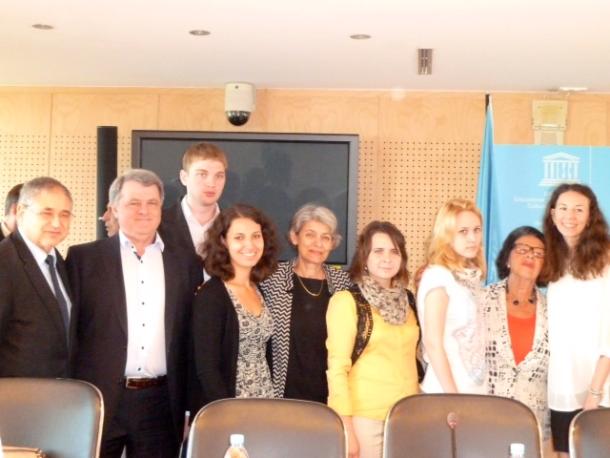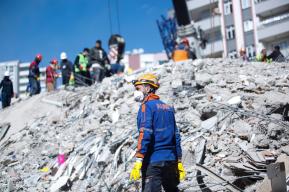News
UNESCO honors the laureates of the 10th annual Russian University Holocaust Essay Competition

“Holocaust is not just the past. For us it is a way also to look at the present, look in the global context in terms of human rights, civil rights, human dignity and to counter some contemporary forms of anti-Semitism,” said the Director-General of UNESCO Irina Bokova, marking the Tenth Edition of the Russian Holocaust Essay Contest, organized by the Simon Wiesenthal Centre and the Association "Verbe et Lumiere" at UNESCO Headquarters in Paris.
The Director-General of UNESCO Irina Bokova congratulated the five laureates of the Tenth Edition of the Russian Holocaust Essay Contest, organised by the Simon Wiesenthal Centre and the Association "Verbe et Lumiere," in presence of Shimon Samuels, Director for International Relations of the Simon Wiesenthal Centre, Ilya Altman, Director of the Russian Research and Educational Holocaust Centre (RHC), Richard Odier, President of the Simon Wiesenthal Centre - Europe, Alla Gerber, Member of Special Chamber and co-Chairman of the Russian Holocaust Centre (RHC), Israeli Ambassador to UNESCO Nimrod Barkan, Rabbi P. Bebe, CRIF President Roger Cukierman, Verbe et Lumiere Alexandre Kaplan, researcher from the Russian Government Archive of Economic History Maria Altman and Director of the UNESCO division of National Commissions and Civil Society Genc Seiti.
Diplomatic delegates of Germany, Israel, France, Russia, Belarus and Canada participated in the meeting, which was chaired by Simon Wiesenthal Centre Director, Dr. Shimon Samuels and co-chaired by RHC Director Ilya Altman.
The Director-General underscored the importance of Holocaust education and mentioned the relevant activities UNESCO is undertaking in this field. Notably, the most recent activities include an international seminar conducted on the impact of Holocaust education and a UNESCO publication entitled “Holocaust education in a global context” which brought together researchers and educators from all continents committed to Holocaust and genocide education.
Director of UNESCO division of National Commissions and Civil Society Genc Seiti recalled UNESCO’s work across the board to support Holocaust education, referring to the production of advocacy materials, consultation and information meetings with member-state representatives, capacity-building seminars and pedagogical research.
“Holocaust education is relevant to every society and to every individual and its promotion goes hand in hand with teaching tolerance and respect. It is essential to promoting human rights which continue to be undermined in many parts of the world,” – said Genc Seiti.
Gens Seiti thanked Graciela Samuels for the preparation of this important event and expressed his satisfaction at the continued interest and support of the member states.
CRIF President Roger Cukierman praised the three organizations-organizers of this event - SWC, "Verbe et Lumiere" and UNESCO – for their work in Holocaust education and defense of human values. He noted the rise in anti-Semitism all over Europe and the growing popularity of extreme-left and extreme-right parties. Dr. Cukierman emphasized the need to find ways to live together peacefully and underscored that religion should not be used to foster hatred, but rather as a means to promote tolerance and peace.
Moscow Parliamentarian and Chair of the Russian Holocaust Centre Alla Gerber, spoke about the rise in Russia of anti-Semitism and multiple highly nationalistic in their rhetoric parties. She pointed out that Russia is not the only country leading the fight against nationalism. “Our main message is this: Holocaust is a memory, but it’s also a warning”, - said Alla Gerber.
Russian Holocaust Centre Director, Dr. Ilya Altman, introduced the five laureates, adding that the accumulated 50 winning essays since 2004, would hopefully soon be published. He also noted that next year’s ceremony would be conducted in partnership with Yad Vashem.
The ceremony featured presentations by the laureates of abstracts of their respective essays addressing specific dimensions of the Holocaust, from art during the Holocaust to the legal prosecution of anti-Semitism in the present day.
This year, over 2,000 submissions from all over the former Soviet Union were judged by the competition coordinator, the Russian Holocaust Centre (RHC) in Moscow.
The five winners were invited to Paris by the French Association Verbe et Lumiиre - Vigilance (founded by the Simon Wiesenthal Centre - Europe), where they were received at UNESCO.






